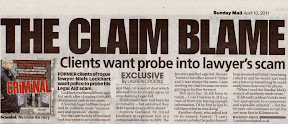Cash rich law quango SLCC gives £1 million gift back to lawyers in latest budget. GREED IS GOOD if you happen to work in the Scottish legal profession as it was revealed today the anti-client Scottish Legal Complaints Commission (SLCC) which received a massive TWO MILLION POUNDS from taxpayers to fund its start up costs which included luxurious offices, financial perks & lavish expenses claims for board members, is yet again giving greedy lawyers a financial boost by releasing £1 million of its near £1.8 million cash stash back to the legal profession to reduce levies on crooked lawyers.
While the SLCC and its extravagantly expenses claiming & quangocrat filled board continue to refuse to repay even one penny of the £2 million of public funds it received in 2007- 2008, money which could prop up a wide range of public services or be put to much better use inside other parts of the justice system, today’s announcement on the SLCC’s 2011-2012 budget shows there appears to be no reluctance to hand millions of pounds back to the very same legal profession the scandal laden law complaints quango is supposedly tasked to regulate.
The figures announced in the SLCC’s budget for 2011-2012 laid before the Scottish Parliament today show a cut in the standard levy applied to all solicitors (and conveyancing and executry practitioners) of £26 to £209 for the year from 1 July 2011 to 30 June 2012. Those in the first three years of practice will pay £105 (also the figure for advocates), and in-house lawyers and those practising outwith Scotland £69. The complaints levy remains unchanged, ranging from no charge where a complaint is resolved at mediation, up to £2,000 for a formal determination upholding a complaint on a third or subsequent occasion, although given the fact the SLCC has only upheld one single complaint since it began ‘regulating’ lawyers in 2008, little in the way of formal determinations have actually been made and certainly not published.
Fergus Ewing as Minister for Communities & Justice wrote letter praising the SLCC for paying back solicitors a few million, no thought of asking for the £2m to be returned. Given the poor state of public funds throughout the country, one might have thought Scottish Ministers would have pressed for some kind of repayment of taxpayers money from the SLCC yet no such moves were made, and stunningly, the now former Minister for Communities & Justice, Fergus Ewing, wrote a letter to the SLCC’s new Chief Executive, Rosemary Agnew, praising the SLCC for “listening to representations from the Law Society” and handing back millions to the legal profession.
Fergus Ewing said in his letter of 2 March 2011 : “I am pleased that the SLCC has been able to take account of the representations from the legal profession and plans to keep a tight rein on running costs for 2011/2012, estimated at just under those for the current year. I note this has allowed the top-end annual levy to be reduced by a further 28 and I am sure this will be welcomed by the profession. I am aware that reducing the amount held in reserve, closer to the minimum of three months running costs recommended by your independent auditors, will put pressure on the levy rates for future years. To reduce this risk, I expect the SLCC to continue to look for further efficiency savings, and I am pleased to note that you are exploring options including the provision of shared services with other public bodies. Jill Clark and her sponsorship team in Legal System Division remain available to help in any way they can with this process. Officials hope to continue dialogue with you towards the end of the year when you are considering setting the rate for the levy 2012/2013.”
SLCC’s new Chief executive Rosemary Agnew replaced remarkably short tenured former CEO Eileen Masterman. Speaking for the Scottish Legal Complaints Commission, Chief executive Rosemary Agnew announced a whopping one million pounds would be handed back to the legal profession although she avoided any mention or concern for the repayment of millions of pounds of public funds squandered on the SLCC. Ms Agnew said: “The general levy for 2011-12 has been set below the amount required to recover our full expenditure costs, which means £1m will be released from our reserves leaving sufficient funds to cover 3.5 months' running costs. This means the general levy will be cut by £26; however, I must emphasise that this level is unlikely to be sustainable in future years. Importantly, although expenditure is budgeted to remain the same, the SLCC aims to deliver a wider range of functions, particularly in relation to the development of our oversight role.”
An official from one of Scotland’s consumer organisations said the SLCC would do better to meet its public expectation of cleaning up the legal profession instead of gifting back most of the money it has accrued to solicitors.
He said : “While I’m sure the Law Society will be very happy to hear the SLCC are reducing levies once again, the fact is that consumers of legal services in Scotland are in just as precarious a position with regard to the regulation of solicitors as they were before the SLCC was created. Perhaps instead of handing out annual gifts to solicitors, the SLCC and its board should concentrate more on its duties mandated in legislation, among them the monitoring of claims against the Master Policy.”
The Law Society of Scotland today said it was happy the SLCC had ‘listened’ to the society’s ‘representations’ over the levy charges, due to solicitors allegedly experiencing a “tough economic situation”.
Law Society of Scotland’s Philip Yelland, in charge of regulation of crooked Scottish lawyers for over 20 years. Commenting on the reduction in levy fee by the Scottish Legal Complaints Commission, Philip Yelland, director of regulation at the Law Society of Scotland, said in a press release : "We are glad that the Scottish Legal Complaints Commission has listened to our representations about the level of fee solicitors will pay in the coming budgetary year. Many solicitors are still making difficult business decisions as there is still a careful balancing act for many solicitors during this ongoing tough economic situation. The £26 decrease in levy fee, which practicing solicitors pay to fund the Commission, is to be welcomed and the Society will continue to represent the profession's interests to the Commission as it carries out its functions."
Clearly the Law Society representations and the bias of Scottish Ministers won the day to keep the legal profession happy, although the £1 million would have been better returned to public funds, where the money is really needed.
BACKGROUND of Law Society’s Regulation Chief.
Philip Yelland ordered solicitors not to take their clients instructions in cases in Scotland’s Court of Session against crooked & negligent lawyers. Mr Philip Yelland was formerly the head of the Law Society’s “Client Relations Office”, holding the position since 1990 and has been involved or in charge of regulation of “crooked lawyers” in Scotland for over twenty years in a period which coincidentally saw huge numbers of complaints against the legal profession which in one year alone topped 5000 complaints against Scottish solicitors. Mr Yelland was also identified in private correspondence sent to solicitors demanding they refuse to represent or take instructions from clients involved in Court of Session cases against some of Scotland’s worst rogue lawyers, among them the well known crooked lawyer Andrew Penman of Stormonth Darling solicitors, Kelso, in the Scottish Borders.
Law Society of Scotland blacklisted clients from legal representation & legal aid. Unsurprisingly, many solicitors who face complaints handed by Mr Yelland’s office ended up receiving little more than a slap on the wrist while ruined clients were barred from court, blacklisted from obtaining legal representation, were privately investigated and were subject to “information gathering exercises” by senior Law Society officials revealed in 2006 at Holyrood’s Justice 2 Committee’s investigation of the Legal Profession & Legal Aid Bill. It was also revealed most clients who ended up victims of the legal profession had received little or no compensation for millions of pounds of plundered client assets.
Mr Yelland’s name was also allegedly linked to the suicide of an Oban client in a report on the Law Society of Scotland’s notoriously corrupt Master Policy Insurance scheme compiled by Professor Frank Stephen & Dr Angela Melville of the Manchester University of Law School in 2009. Papers studied by the University team yet not released to the public alleged a man from Oban had been sent to a Glasgow law firm to represent him in a court case against a crooked law firm yet the Glasgow law firm did nothing for a period of three years and after it was revealed the same firm also represented the Legal Defence Union, the shady organisation which represents crooked lawyers against complaints, the Oban client committed suicide.
The final report from the University of Manchester Law School on the Master Policy can be viewed or downloaded here : Report on the Master Policy by University of Manchester Law School, Dr Angela Melville & Professor Frank Stephen.
My coverage of the report’s release & conclusions is here : 'Ground-breaking' investigation into Law Society's Master Policy insurance reveals realities of corrupt claims process against crooked lawyers & here : Suicides, illness, broken families and ruined clients reveal true cost of Law Society's Master Policy which 'allows solicitors to sleep at night'
The Law Society of Scotland & others linked to the Oban case have never commented on their role in events which some allege drove the unnamed client to suicide and readers may recall from recent news the Legal Defence Union played a significant part in negotiating a secret deal with the Scottish Legal Aid Board to secure no action against solicitor Niels S Lockhart for alleged legal aid irregularities.
All this trouble, expense, political interference from Scottish Ministers, clients intimidated & suicides just so lawyers can sleep soundly at night, as the report on the Master Policy from Dr Melville & Professor Stephen so accurately stated.


